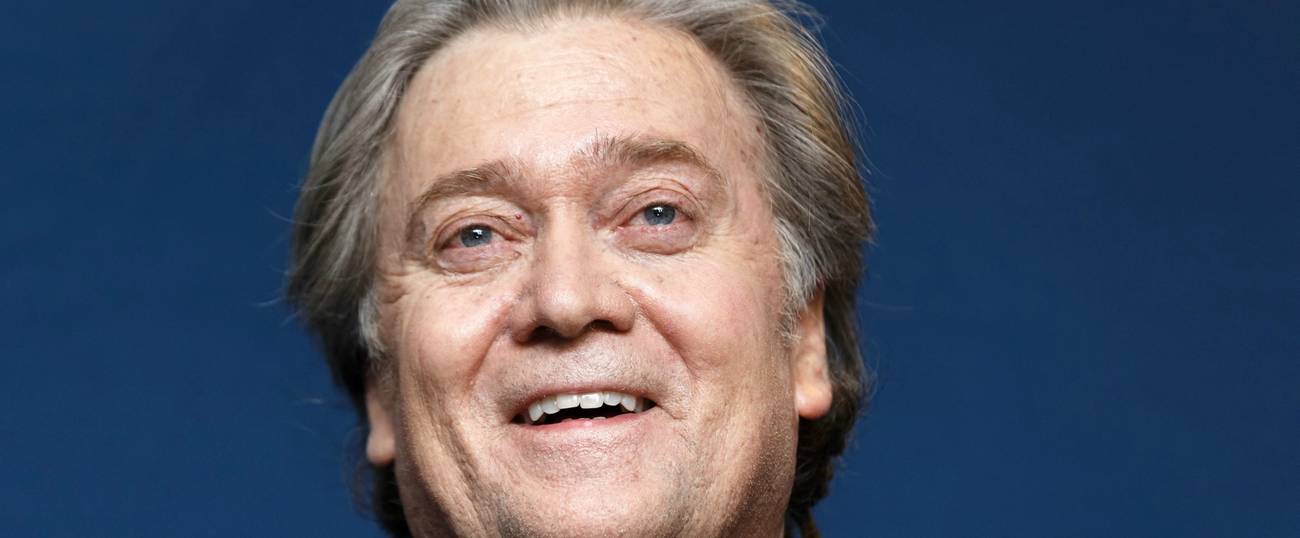I Chose to Spend Shabbat With Steve Bannon
An observant Jew’s commitment to liberal values leads him to skip Shabbat for a debate between Steve Bannon and David Frum




In the aftermath of the Pittsburgh massacre, organized North American Jewry called on us to Show Up For Shabbat. They asked that we Jews make a concerted effort to attend a synagogue even if it is not our personal norm. Yet I, a Sabbath-observing Jew, needed to be someplace else this past Friday night. My beit knesset for the evening was Roy Thomson Hall, where David Frum debated Steve Bannon on whether the future belonged to populist or liberal politics.
Frum expressed a desire to speak to three categories of people. First, the few undecided folks subject to the error that the deceptions of populism may offer them something. Second, folks like me and the clear majority of those gathered, who see populism as an obvious and explicit threat and have come together to loudly resist. And third, folks who see populism for what it is and support it. In a line that nearly brought me to tears, Frum boldly stated to those who defend Trump that while the past five years have been good to them financially, it is ending. And he warned that in the aftermath “your children will look at you with disgust and disavow you.”
I needed to bear witness to those words. For in my synagogue, conversation over Kiddush is invariably a hybrid defense of Trump and conspiratorial tirade against liberalism. And sometimes it goes darker, as it did this past week, when a not insignificant number of my co-religionists were relieved by the news that the bris celebrated at the time of the massacre was hosted by gay parents, who were, in their bigoted eyes, more deserving victims.
The essential appeal of populism, as Frum explained, is in the angry and fearful move to make a segment of the population the “other,” thus protecting the in-group from reflecting on the complexity of its social existence. Trumpian populism speaks to the religious right precisely because it offers a false sheen of morality on immoral behavior.
Sadly, it is not only the religious right who have been taken by a spirit of illiberalism. In order to enter the debate, we were forced to endure a perp walk through a gauntlet of protesters. Most painful for me and my academic companion, was the fact that many of those shouting at us were our colleagues from local universities. To them, we were what media folks or Clinton supporters might have been at a Trump rally, an irredeemable “other.”
Theirs was a left-wing populism that sought to force me to choose between my identity and agency as a Jewish person and grandchild of Holocaust survivors and my belief in the power of debate. I needed to be in that particular room on this particular night for the cathartic release of seeing a fellow Jew look someone as powerful and dangerous as Bannon directly in the eyes, reference the upcoming 80th anniversary of Kristallnacht and affirm a liberal morality. Perhaps we take it for granted now but Jews have not always had this power in the face of illiberal threats.
But the protesters would not let David Frum self-define as a Jew who was there to defend liberalism. They needed to define him as an illiberal imperial warmonger. I had seen this type of protest before from my colleagues, as populists have only one play. The protesters applied the same scorn to liberals who’d come to see Bannon get taken down as they did to alt-right bros who gathered to see Milo.
As an academic, I pride myself in laying out the conditions under which I would be proven wrong. Why wouldn’t my protesting colleagues do the same? Bannon was not given an uncritical platform on which to spread hate and, in fact, he was loudly booed when suggesting that Trump’s nationalist project wasn’t racist. A highlight of the night was Frum responding to Bannon’s claim of mobilizing African-American and Hispanic voters with “If that were true, then why would Republicans try so hard to prevent them from voting?” Further, Frum took the time to admit that the Iraq War was a mistake, a move antithetical to imperialist warmongering. Yet, as Jonathan Kay captured, a fellow York University professor instead tweeted lies about children in attendance in Hitler T-shirts.
Orthodox Jews and left-wing protesters alike need to respect the liberal values of debate, the free exchange of ideas and allow for individual moral agency. Yet both my left-wing academic colleagues and Orthodox co-religionists blind themselves in their certainties to the moral imperative of open debate. The simple act of keeping a conversation going is, in fact, a moral good in our troubled times.
The evening gave me hope. Spending the night watching a Jew confront Bannon instead of being at shul left me invigorated by the power of words. Sure, there is a lot of work to be done, and not enough people committed to doing it. But I’m grateful, though, that there are still a few spaces available for people to gather and debate. Let’s try and ensure our synagogues and universities are among them.
David Weitzner is an assistant professor of management at York University. His book Connected Capitalism: How Jewish Wisdom Can Transform Work is out now through University of Toronto Press and Penguin Random House Audio. Follow him on Twitter @WeitznerDavid.